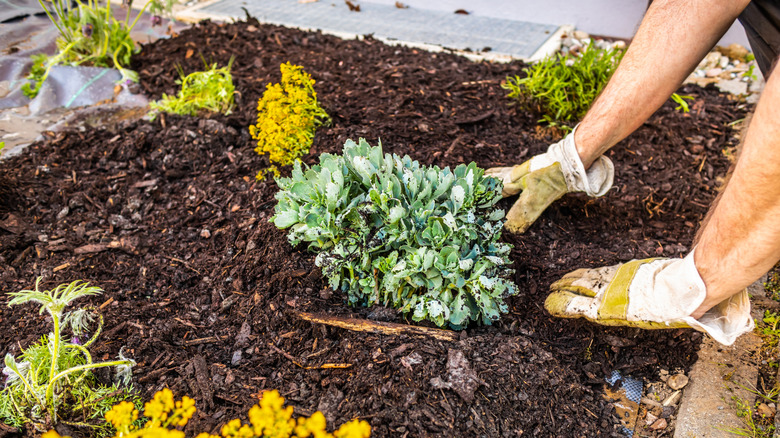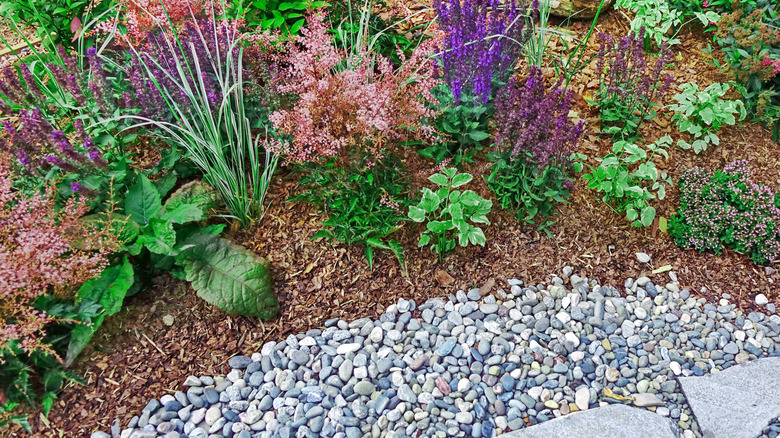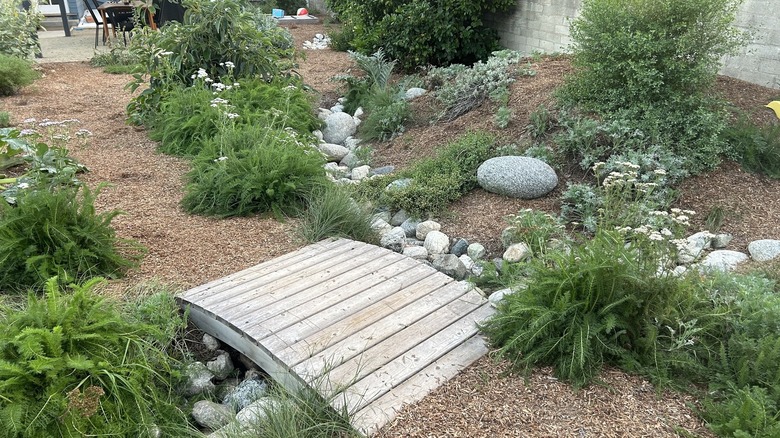Can You Layer Gravel Under Mulch For Extra Benefits? Here's What You Should Know
Gravel and mulch are two of the most common and versatile ground covers available. While they each have their distinct uses — gravel is best for weed control while mulch is great for encouraging healthy plants in your garden — sometimes they don't seem to do enough on their own to mitigate pesky garden woes. While many gardeners try switching from one to the other to solve their landscaping issues (here's the correct way to switch from gravel to mulch), the great ground cover debate of mulch versus gravel got us thinking: Is it ever worth combining the two?
To find the answer, we turned to a trusted expert who revealed two isn't always better than one. Lara Hermanson is the principal and co-founder of Farmscape, a food-focused landscape design company serving Los Angeles and the Bay Area. They specialize in sustainable, low-water gardening solutions that combine food crops with native plants. Speaking exclusively with House Digest, Hermanson said that in most cases, she recommends sticking with mulch alone to troubleshoot your landscaping needs. "At Farmscape, we focus on creating landscapes that are not only beautiful but also functional and sustainable," she said, "Adding gravel can create more complexity without providing additional benefits."
Why adding gravel under mulch isn't worth it, according to an expert
While gravel is effective at curbing weed growth, Lara Hermanson said adding it under mulch simply does not provide enough ROI to justify the extra effort. Especially since they work in a dry climate, Hermanson and her team tend to avoid gravel around plants, and instead utilize ground cover that aids water retention, such as water-efficient mulch. Speaking exclusively with House Digest, Hermanson explained, "Gravel doesn't offer any real benefit when layered under mulch and can be a costly addition."
Along with the added cost, the extra maintenance is also a deterrent. "If not installed correctly, gravel can make maintenance difficult and may require more upkeep to ensure the health of your plants," Hermanson said. The biggest risk in layering gravel under mulch, however, is to the plants it surrounds. "Gravel combined with mulch can actually restrict plant growth and cause root rot in some cases," she added.
Instead of adding gravel to your mulch, Hermanson recommended sticking with eco-friendly mulches to provide ground cover while supporting your plants. "If you're looking to improve drainage and prevent weeds, mulch alone can do the trick," she said. Mulch is a tried-and-true, environmentally-conscious solution to reduce your lawn area while promoting water efficiency. And there are many eco-friendly mulch options to use in your garden.
Best mulch supplements to help your yard thrive
While gravel might not be recommended to supplement mulch, there are several expert-approved landscaping additions that can help improve drainage, prevent weeds, and help mulch stay put. Speaking exclusively with House Digest, Lara Hermanson recommended alternatives that will help your whole yard or garden thrive. Because her team focuses on maximizing water efficiency in their designs, one element they often incorporate is a rain garden. Rain gardens "naturally absorb excess water while supporting native plants," Hermanson explained. Speaking of native plants, they also make great additions to mulch for landscaping management. "We use native plants that are well-suited to the environment and require less water and maintenance," Hermanson said. "This helps with drainage while reducing the need for mulch altogether."
If you are growing food crops or other plants and want greater control of their soil conditions, utilizing raised beds in your garden can make more of a difference than a gravel-mulch layer. "We often recommend raised garden beds to ensure that the plants are well-drained, while also utilizing organic materials to help keep moisture levels just right," Hermanson said. If you are still experiencing landscaping issues, she shared, "For more complex projects, we recommend consulting a professional landscaper to determine the best materials for your unique garden needs."


